雅思阅读TFNG模拟试题(4)
雅思阅读预测真题库4参考答案
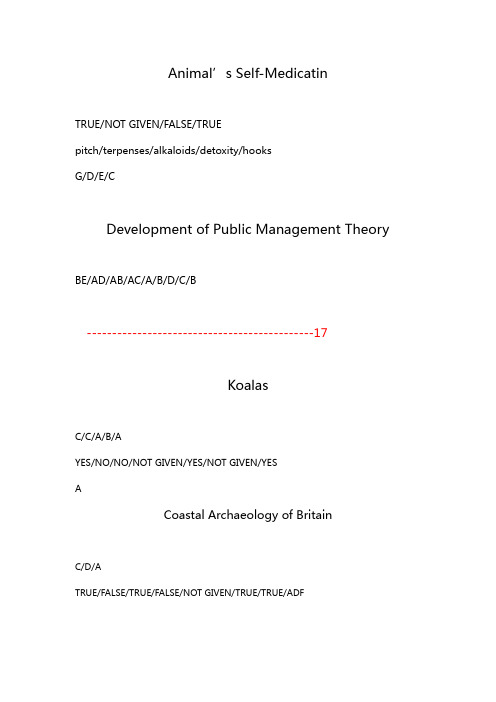
Animal’s Self-MedicatinTRUE/NOT GIVEN/FALSE/TRUEpitch/terpenses/alkaloids/detoxity/hooksG/D/E/CDevelopment of Public Management Theory BE/AD/AB/AC/A/B/D/C/B---------------------------------------------17KoalasC/C/A/B/AYES/NO/NO/NOT GIVEN/YES/NOT GIVEN/YESACoastal Archaeology of BritainC/D/ATRUE/FALSE/TRUE/FALSE/NOT GIVEN/TRUE/TRUE/ADFCommunication Styles and Conflictiii/vii/i/iv/ix/viii/v/iiTRUE/FALSE/NOT GIVEN/TRUE/TRUEBTalc Powder Applied on Food and Agricultural Industries B/B/A/A/C/B20/foam/wastewater/harmful/biodegrade/droplet(s)/lamination(packing)/gr ape grower(s)Human Navigation-finding our wayB /C / A / C / B / C /D / A /TRUE / NOT GIVEN / TRUE / FALSE / NOT GIVENPlant ScentsB/A/F/CTRUE/NOT GIVEN/TRUE/FALSEB/B/C/D/AAgriculture and T ourismA/B/C/C/A/B/Dbenefit/survey/three/cooperation/experience/incomesE-trainingiii/v/vii/ii/ix/viiiD/B/A/F/ACDChoices and HappinessB/D/A/CFALSE/NOT GIVEN/TRUE/FALSE/TRUEB/A/D/CPaper or Computer ?iv / iii /viii /ii / ix /vii / iflexible /tangible / tailorableC /A / A /DThe “Extinct”Grass in BritainFALSE/FALSE/NOT GIVEN/TRUE/FALSE/TRUE/NOT GIVENE/F/A/D/B/CExtinction Mysterious of the DinosaursNO/YES/NOT GIVEN/YES/NO/YESecologicalrelease/competitors/dragons/overlooked/vanished/recycled/ misdatedMalaria in Italyinsect/unclean air/life expectancy/hereditaryYES/NG/NO/YESE/G/B/F/C/AAntarctica--in from the ColdD/E/F/C/A/C/A/B/B/D/C/A/CThe PearlB/D/E/ETRUE/FALSE/NOT GIVENB/J/K/F/C/DThe History of “Farmer”E/B/G/D/Hmail-order company/chain store/buying offices/celebration/big family/B/C/ABiodiversityTRUE/FALSE/TRUE/TRUE/FALSE/NOT GIVEN/NOT GIVEN keystone(species)/fig families(or figs)/(sea) urchins/cactus moth/Australia/public educationFood for Thoughtviii/ii/iv/x/i/v/viiH/F/I/A/C/B/E。
雅思阅读考前模拟题附答案
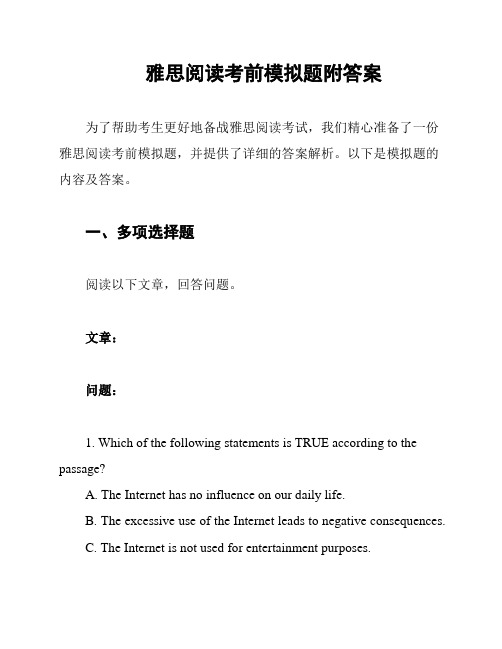
雅思阅读考前模拟题附答案为了帮助考生更好地备战雅思阅读考试,我们精心准备了一份雅思阅读考前模拟题,并提供了详细的答案解析。
以下是模拟题的内容及答案。
一、多项选择题阅读以下文章,回答问题。
文章:问题:1. Which of the following statements is TRUE according to the passage?A. The Internet has no influence on our daily life.B. The excessive use of the Internet leads to negative consequences.C. The Internet is not used for entertainment purposes.答案:B. The excessive use of the Internet leads to negative consequences.二、判断题阅读以下文章,判断句子是否正确。
文章:Technological advancements have significantly changed the way we live and work. Automation and artificial intelligence have replaced many traditional jobs, leading to concerns about unemployment.问题:1. The Internet has no influence on the way we live and work.2. Technological advancements have led to an increase in unemployment.答案:1. FALSE (The Internet has a significant influence on the way we live and work.)2. TRUE (Technological advancements have led to concerns about unemployment.)三、填空题阅读以下文章,完成句子。
雅思阅读TFNG模拟试题
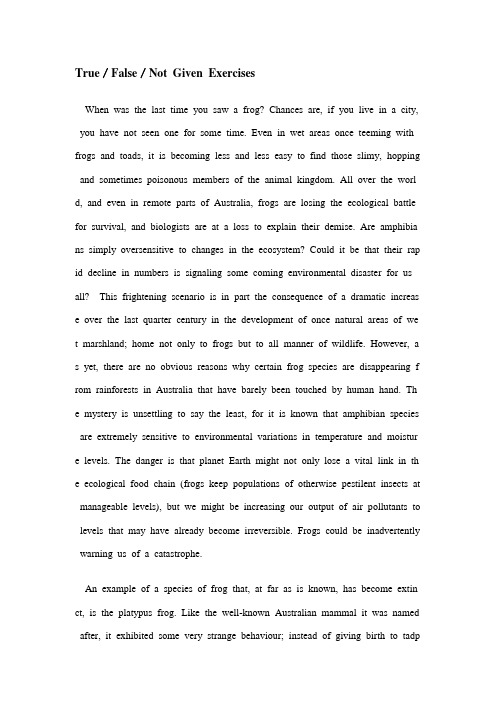
True/False/Not Given ExercisesWhen was the last time you saw a frog? Chances are, if you live in a city, you have not seen one for some time. Even in wet areas once teeming with frogs and toads, it is becoming less and less easy to find those slimy, hopping and sometimes poisonous members of the animal kingdom. All over the worl d, and even in remote parts of Australia, frogs are losing the ecological battle for survival, and biologists are at a loss to explain their demise. Are amphibia ns simply oversensitive to changes in the ecosystem? Could it be that their rap id decline in numbers is signaling some coming environmental disaster for us all?This frightening scenario is in part the consequence of a dramatic increas e over the last quarter century in the development of once natural areas of we t marshland; home not only to frogs but to all manner of wildlife. However, a s yet, there are no obvious reasons why certain frog species are disappearing f rom rainforests in Australia that have barely been touched by human hand. Th e mystery is unsettling to say the least, for it is known that amphibian species are extremely sensitive to environmental variations in temperature and moistur e levels. The danger is that planet Earth might not only lose a vital link in th e ecological food chain (frogs keep populations of otherwise pestilent insects at manageable levels), but we might be increasing our output of air pollutants to levels that may have already become irreversible. Frogs could be inadvertently warning us of a catastrophe.An example of a species of frog that, at far as is known, has become extin ct, is the platypus frog. Like the well-known Australian mammal it was named after, it exhibited some very strange behaviour; instead of giving birth to tadpoles in the water, it raised its young within its stomach. The baby frogs were actually born from out of their mother's mouth. Discovered in 1981, less than ten years later the frog had completely vanished from the crystal clear waters of Booloumba Creek near Queensland's Sunshine Coast. Unfortunately, this frea k of nature is not the only frog species to have been lost in Australia. Since t he 1970s, no less than eight others have suffered the same fate.One theory that seems to fit the facts concerns the depletion of the ozone la yer, a well documented phenomenon which has led to a sharp increase in ultra violet radiation levels.The ozone layer is meant to shield the Earth from UV r ays, but increased radiation may be having a greater effect upon frog populatio ns than previously believed. Another theory is that worldwide temperature incre ases are upsetting the breeding cycles of frogs.TRUE/FALSE/NOT GIVEN1.Frogs are disappearing only from city areas.2.Frogs and toads are usually poisonous.3.Biologists are unable to explain why frogs are dying.4.The frogs' natural habitat is becoming more and more developed.5.Attempts are being made to halt the development of wet marshland.6.Frogs are important in the ecosystem because they control pests.7.The platypus frog became extinct by 1991.8.Frogs usually give birth to their young in an underwater nest.9.Eight frog species have become extinct so far in Australia.10.There is convincing evidence that the ozone layer is being depleted.11.It is a fact that frogs' breeding cycles are upset by worldwide in creases in temperature.Answer Keys1.F 2.F 3.T 4.T 5.NG 6.T 7.T 8.NG 9.F 10.T 11.F。
雅思阅读TFNG
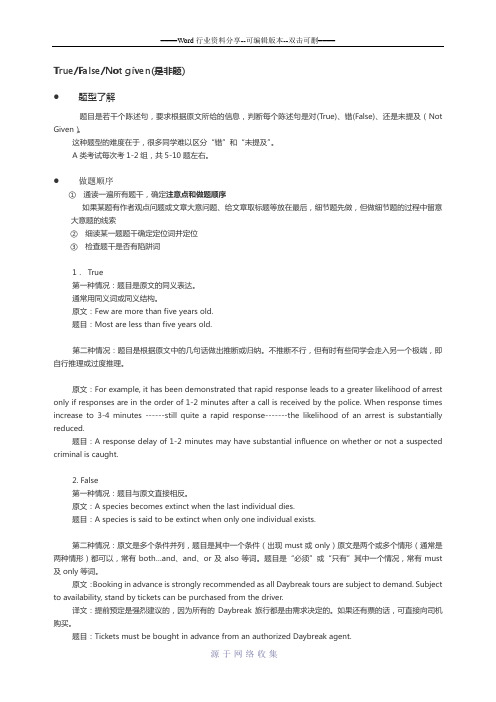
True/False/Not given(是非题)●题型了解题目是若干个陈述句,要求根据原文所给的信息,判断每个陈述句是对(True)、错(False)、还是未提及(Not Given)。
这种题型的难度在于,很多同学难以区分“错”和“未提及”。
A类考试每次考1-2组,共5-10题左右。
●做题顺序①通读一遍所有题干,确定注意点和做题顺序如果某题有作者观点问题或文章大意问题、给文章取标题等放在最后,细节题先做,但做细节题的过程中留意大意题的线索②细读某一题题干确定定位词并定位③检查题干是否有陷阱词1.True第一种情况:题目是原文的同义表达。
通常用同义词或同义结构。
原文:Few are more than five years old.题目:Most are less than five years old.第二种情况:题目是根据原文中的几句话做出推断或归纳。
不推断不行,但有时有些同学会走入另一个极端,即自行推理或过度推理。
原文:For example, it has been demonstrated that rapid response leads to a greater likelihood of arrest only if responses are in the order of 1-2 minutes after a call is received by the police. When response times increase to 3-4 minutes ------still quite a rapid response-------the likelihood of an arrest is substantially reduced.题目:A response delay of 1-2 minutes may have substantial influence on whether or not a suspected criminal is caught.2. False第一种情况:题目与原文直接相反。
剑桥雅思阅读4原文翻译及答案解析(test4)
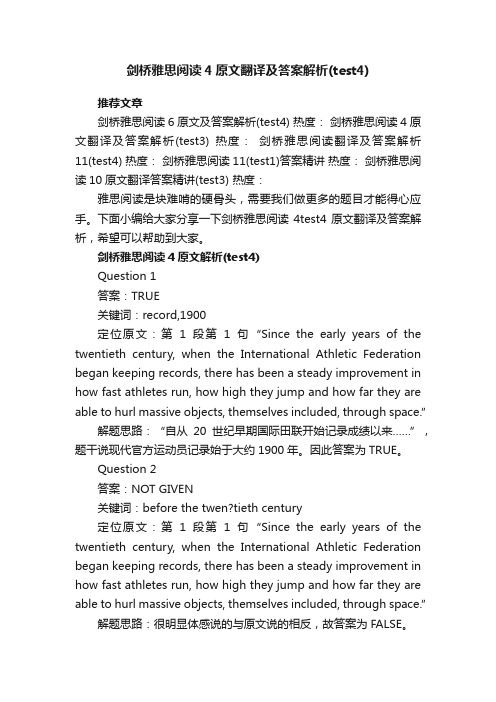
剑桥雅思阅读4原文翻译及答案解析(test4)推荐文章剑桥雅思阅读6原文及答案解析(test4) 热度:剑桥雅思阅读4原文翻译及答案解析(test3) 热度:剑桥雅思阅读翻译及答案解析11(test4) 热度:剑桥雅思阅读11(test1)答案精讲热度:剑桥雅思阅读10原文翻译答案精讲(test3) 热度:雅思阅读是块难啃的硬骨头,需要我们做更多的题目才能得心应手。
下面小编给大家分享一下剑桥雅思阅读4test4原文翻译及答案解析,希望可以帮助到大家。
剑桥雅思阅读4原文解析(test4)Question 1答案:TRUE关键词:record,1900定位原文:第1段第1句“Since the early years of the twentieth century, when the International Athletic Federation began keeping records, there has been a steady improvement in how fast athletes run, how high they jump and how far they are able to hurl massive objects, themselves included, through space.”解题思路:“自从20世纪早期国际田联开始记录成绩以来……”,题干说现代官方运动员记录始于大约1900年。
因此答案为TRUE。
Question 2答案:NOT GIVEN关键词:before the twen?tieth century定位原文:第1段第1句“Since the early years of the twentieth century, when the International Athletic Federation began keeping records, there has been a steady improvement in how fast athletes run, how high they jump and how far they are able to hurl massive objects, themselves included, through space.”解题思路:很明显体感说的与原文说的相反,故答案为FALSE。
2019-雅思阅读模拟试题(四)(附答案)-范文word版 (1页)
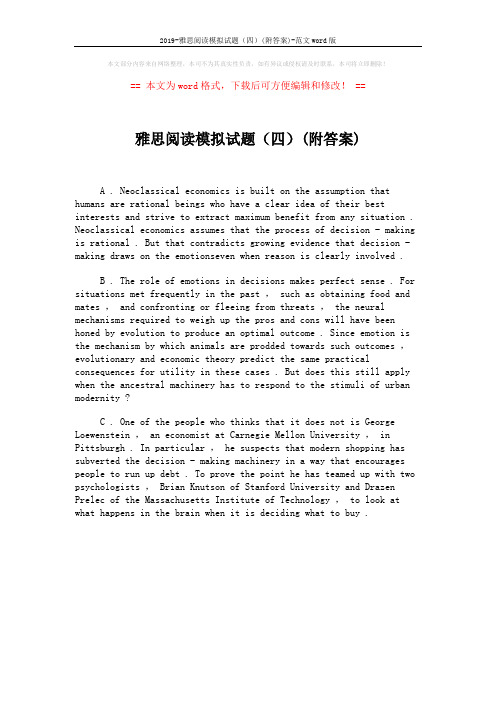
2019-雅思阅读模拟试题(四)(附答案)-范文word版本文部分内容来自网络整理,本司不为其真实性负责,如有异议或侵权请及时联系,本司将立即删除!== 本文为word格式,下载后可方便编辑和修改! ==雅思阅读模拟试题(四)(附答案)A . Neoclassical economics is built on the assumption that humans are rational beings who have a clear idea of their best interests and strive to extract maximum benefit from any situation . Neoclassical economics assumes that the process of decision - making is rational . But that contradicts growing evidence that decision - making draws on the emotionseven when reason is clearly involved .B . The role of emotions in decisions makes perfect sense . For situations met frequently in the past , such as obtaining food and mates , and confronting or fleeing from threats , the neural mechanisms required to weigh up the pros and cons will have been honed by evolution to produce an optimal outcome . Since emotion is the mechanism by which animals are prodded towards such outcomes ,evolutionary and economic theory predict the same practical consequences for utility in these cases . But does this still apply when the ancestral machinery has to respond to the stimuli of urban modernity ?C . One of the people who thinks that it does not is George Loewenstein , an economist at Carnegie Mellon University , in Pittsburgh . In particular , he suspects that modern shopping has subverted the decision - making machinery in a way that encourages people to run up debt . To prove the point he has teamed up with two psychologists , Brian Knutson of Stanford University and Drazen Prelec of the Massachusetts Institute of Technology , to look at what happens in the brain when it is deciding what to buy .。
2021年雅思阅读模拟练习试题及答案
2021年雅思阅读模拟练习试题及答案:全球变
暖与动物影响
2021年雅思阅读模拟练习试题及答案:沙丘
2021年雅思阅读模拟练习试题及答案:提炼饮
用水
2021年雅思阅读模拟练习试题及答案:象形文
字
2021年雅思阅读模拟练习试题及答案:生物多
样性
雅思阅读解析及答案:生物多样性
2021年雅思阅读模拟练习试题及答案:管理学
者
雅思阅读解析及答案:管理学者
2021年雅思阅读模拟练习试题及答案:巧克力
的历史
雅思阅读解析及答案:巧克力的历史
2021年雅思阅读模拟练习试题及答案:简单英
语
2021年雅思阅读模拟练习试题及答案:苏联劳
动时间的变化
2021年雅思阅读模拟练习试题及答案:金星凌
日
2021年雅思阅读模拟练习试题及答案:新手与
专家
雅思阅读解析及答案:新手与专家
2021年雅思阅读模拟练习试题及答案:竹子雅思阅读解析及答案:竹子。
雅思阅读T-F-NG模拟试题(4)
雅思阅读T/F/NG模拟试题(4)雅思阅读T/F/NG模拟试题(4)雅思阅读T/F/NG模拟试题(4) practice 4para 1.the need for a satisfactory education is more important than ever before. nowadays, without a qualification from a reputable school or university, the odds of landing that plum job advertised in the paper are considerably shortened. moreover, one's present level of education could fall well short of future career requirements.para 2.it is no secret that competition is the driving force behind the need to obtain increasingly higher qualifications. in the majority of cases, the urge to upgrade is no longer the result of an insatiable thirst for knowledge. the pressure is coming from within the workplace to compete with ever more qualified job applicants, and in many occupations one must now battle with colleagues in the reshuffle for the position one already holds.para 3.striving to become better educated is hardly a new concept. wealthy parents have always been willing to spend the vast amounts of extra money necessary to send their children to schools with a perceived educational edge.working adults have long attended night schools and refresher courses. competition for employment has been around since the curse of working for a living began. is the present situation so very different to that of the past?para 4. the difference now is that the push is universal and from without as well as within. a student at secondary school receiving low grades is no longer as easily accepted by his or her peers as was once the case. similarly, in the workplace, unless employees are engaged in part-time study, they may be frowned upon by their employers and peers and have difficulty even standing still. in fact, in these cases, the expectation is for careers to go backwards and earning capacity to take an appreciable nosedive.para 5.at first glance, the situation would seem to be laudable; a positive response to the exhortation by a former prime minister, bob hawke, for australia to become the `clever country'. yet there are serious ramifications according to at least one educational psychologist. dr brendan gatsby has caused some controversy in academic circles by suggesting that a bias towards what he terms `paper'excellence might cause more problems than it is supposed to solve. gatsby raises a number of issues that affect the individual as well associety in general.para 6.firstly, he believes the extra workload involved is resulting in abnormally high stress levels in both students at secondary school and adults studying after working hours. secondly, skills which might be more relevant to the undertaking of a sought_after job are being overlooked by employers interviewing candidates without qualifications on paper. these two areas of concern for the individual are causing physical and emotional stress respectively.para 7.gatsby also argues that there are attitudinal changes within society to the exalted role education now plays in determining how the spoils of working life are distributed. individuals of all ages are being driven by social pressures to achieve academic success solely for monetary considerations instead of for the joy of enlightenment. there is the danger that some universities are becoming degree factories with an attendant drop in standards. furthermore, our education system may be rewarding doggedness above creativity; the very thing australians have been encouraged to avoid.but the most undesirable effect of this academic paper chase, gatsby says,is the disadvantage that `user pays'higher education confers on the poor, who invariably lose out to the morefinancially favoured.para 8.naturally, although there is agreement that learning can cause stress, gatsby's comments regarding university standards have been roundly criticised as alarmist by most educationists who point out that, by any standard of measurement, australia's education system overall, at both secondary and tertiary levels, is equal to that of any in the world.true/false/not given1.it is impossible these days to get a good job without a qualification from a respected institution.2.most people who upgrade their qualifications do so for the joy of learning.3.in some jobs, the position you hold must be reapplied for.4.some parents spend extra on their children's education because of the prestige attached to certain schools5.according to the text, students who performed bally at school used to be accepted by their classmates.6.employees who do not undertake extra study may find their salary decreased by employers.7.australians appear to have responded to the call by a former prime minister to become better qualified.8.australia's education system is equal to any in the world in the opinion of most educationists.answer keys1.f2.f3.t4.ng5.t6.ng7.t8.t雅思阅读T/F/NG模拟试题(4) 相关内容:。
雅思阅读T F NG模拟题(3)
雅思阅读T F NG模拟题(3)雅思阅读T/F/NG模拟题(3)Practice 3The Australian political scene is dominated by two major parties that have quite different political agendas. However, the policies of the Australian Labor Party and the Liberal Party have bee much more difficult to tell apart in recent years. In fact, it would be true to say that both parties consist of conservative, moderate and radical elements, and therefore the general public is often perplexed about which party to vote for. Noheless, it is usual to find that an Australian will lean towards supporting one of these two parties and remain faithful to that party for life.The Labor Party was formed early in the twentieth century to safeguard the interests of the mon working man and to give the trade unions political representation in Parliament. The Party has always had strong connections with the unions, and supports the concept of a welfare society in which people who are less fortunate than others are financially, and otherwise, assisted in their quest for a more equitable slice of the economic pie. The problem is that such socialist political agendas are extremely expensive to implement and maintain, especially in a country that, although paratively wealthy, is vast and witha small working and hence taxpaying population base. Welfare societies tend towards bankruptcy unless government spending is kept in check. The Liberal Party, on the other hand, argues that the best way to ensure afair division of wealth in the country is to allow more freedom to create it.This, in turn, means more opportunities, jobs created etc., and therefore more wealth available to all. Just how the poor are to share in the distribution of this wealth (beyond being given, at least in theory, the opportunity to create it) is, however, less well understood. Practice, of course, may make nonsense of even the best theoretical intentions, and often the less politically powe。
雅思阅读T-F-NG模拟题(2)
雅思阅读T/F/NG模拟题(2)Almost everyone with or without a computer is aware of the latest technological revolution destined to change forever the way in which humans communicate, namely, the Information Superhighway, best exemplified by the ubiquitous Internet. Already, millions of people around the world are linked by computer simply by having a modem and an address on the `Net', in much the same way that owning a telephone links us to almost anyone who pays a phone bill. In fact, since the computer connections are made via the phone line, the Internet can be envisaged as a network of visual telephone links. It remains to seen in which direction the Information Superhighway is headed, but many believeit is the educational hope of the future.The World Wide Web, an enormous collection of Internet addresses or sites, all of which can be accessed for information, has been mainly responsible for the increase in interest in the Internet in the 1990s. Before the World Wide Web, the `Net' was comparable to an integrated collection of computerized typewriters, but the introduction of the `Web' in 1990 allowednot only text links to be made but also graphs, images and even video.A Web site consists of a `home page', the first screen of a particular site on the computer to which you are connected, from where access can be had to other subject related `pages'(or screens) at the site and on thousands of other computers all over the world. This is achieved by a process called `hypertext'. By clicking with a mouse device on various parts of the screen, a person connected to the `Net' can go traveling, or surfing' through a of the screen, a person connected to the `Net' can go traveling, or `surfing' through a web of pages to locate whatever information is required.Anyone can set up a site; promoting your club, your institution, your company's products or simply yourself, is what the Web and the Internet is all about. And what is more, information on the Internet is not owned or controlled by any one organization. It is, perhaps, true to say that no one and therefore everyone owns the `Net'. Because of the relative freedom of access to information, the Internet has often been criticised by the media as a potentially hazardous tool in the hands of young computer users. This perception has proved to be largely false however, and the vast majority of users bothyoung and old get connected with the Internet for the dual purposes for which it was intended - discovery and delight.TRUE/FALSE/NOT GIVEN1.Everyone is aware of the Information Superhighway.ing the Internet costs the owner of a telephone extra money.3.Internet computer connections are made by using telephone lines.4.The World Wide Web is a network of computerised typewriters.5.According to the author, the Information Superhighway may be the future hope of education.6.The process called`hypertext'requires the use of a mouse device.7.The Internet was created in the 1990s.8.The `home page'is the first screen of a `Web'site on the `Net'.9.The media has often criticised the Internet because it is dangerous.10. The latest technological revolution will change the way humans communicate.Answer Keys1.F2.NG3.T4.F5.T6.T7.F8.T9.F 10.T明天继续雅思阅读T/F/NG模拟题(2) 相关内容:。
- 1、下载文档前请自行甄别文档内容的完整性,平台不提供额外的编辑、内容补充、找答案等附加服务。
- 2、"仅部分预览"的文档,不可在线预览部分如存在完整性等问题,可反馈申请退款(可完整预览的文档不适用该条件!)。
- 3、如文档侵犯您的权益,请联系客服反馈,我们会尽快为您处理(人工客服工作时间:9:00-18:30)。
雅思阅读TFNG模拟试题(4)Practice 4��Para 1.�玊he need for a satisfactory education is more important than ever before. Nowadays, without a qualification from a reputable school or university, the odds of landing that plum job advertised in the paper are considerably shortened. Moreover, one's present level of education could fall well short of future career requirements.�お�para 2.�獻t is no secret that competition is the driving force behind the need to obtain increasingly higher qualifications. In the majority of cases, the urge to upgrade is no longer the result of an insatiable thirst for knowledge. The pressure is coming from within the workplace to compete with ever more qualified job applicants, and in many occupations one must now battle with colleagues in the reshuffle for the position one already holds.�お�para 3.�玈triving to become better educated is hardly a new concept. Wealthy parents have always been willing to spend the vast amounts of extra money necessary to send their children to schools with a perceivededucational edge. Working adults have long attended night schools and refresher courses. Competition for employment has been around since the curse of working for a living began. Is the present situation so very different to thatof the past?para 4. �玊he difference now is that the push is universal and from without as well as within. A student at secondary school receiving low grades is no longer aseasily accepted by his or her peers as was once the case. Similarly, in the workplace, unless employees are engagedin part-time study, they may be frowned upon by their employers and peers and have difficulty even standing still. In fact, in these cases, the expectation is for careers to go backwards and earning capacity to take an appreciable nosedive.�お�para 5.�獳t first glance, the situation would seem to be laudable; a positive response to the exhortation by a former Prime Minister, Bob Hawke, for australia to become the `clever country'. Yet there are serious ramifications according to at least one educational psychologist. Dr Brendan Gatsby has caused some controversy in academiccircles by suggesting that a bias towards what he terms`paper'excellence might cause more problems than it is supposed to solve. Gatsby raises a number of issues that affect the individual as well as society in general.�お� para 6.�獸irstly, he believes the extra workload involved is resulting in abnormally high stress levels in both students at secondary school and adults studying after working hours. Secondly, skills which might be more relevant to the undertaking of a sought_after job are being overlooked by employers interviewing candidates without qualifications on paper. These two areas of concern for the individual are causing physical and emotional stress respectively.para 7.�獹atsby also argues that there are attitudinal changes within society to the exalted role education now plays in determining how the spoils of working life are distributed. Individuals of all ages are being driven by social pressures to achieve academic success solely for monetary considerations instead of for the joy of enlightenment. There is the danger that some universities are becoming degree factories with anattendant drop in standards. Furthermore, our education system may be rewarding doggedness above creativity; the very thing Australians have been encouraged to avoid.But the most undesirable effect of this academic paper chase, Gatsby says,is the disadvantage that `user pays'higher education confers on the poor, who invariably lose out to the more financially favoured.�お�para 8.�玁aturally, although there is agreement that learning can cause stress, Gatsby's comments regarding university standards have been roundly criticised as alarmist by most educationists who point out that, by any standard of measurement, Australia's education system overall, at both secondary and tertiary levels, is equal to that of any in the world.TRUE/FALSE/NOT GIVEN1.It is impossible these days to get a good job without a qualification from a respected institution.2.Most people who upgrade their qualifications do so for the joy of learning.3.In some jobs, the position you hold must be reapplied for.4.Some parents spend extra on theirchildren's education because of the prestige attached tocertain schools5.According to the text, students who performed bally at school used to be accepted by their classmates.6.Employees who do not undertake extra study may find their salary decreased by employers.7.Australians appear to have responded to the call by a former Prime Minister to become better qualified.8.Australia's education system is equal to any in the world in the opinion of most educationists.Answer Keys1.F2.F3.T4.NG5.T6.NG7.T8.T。
